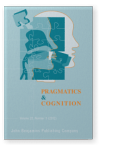Vol. 20:3 (2012) ► pp.447–482
Sum, quorum, tether
Design principles underlying external representations that promote sustainability
We outline three challenges involved in designing external representations that promote sustainable use of natural resources. First, the task environment of sustainable resource-use is highly unstructured, and involves many uncoordinated and asynchronous actions. Following from this complex nature of the task environment, more task constraints and task interactions are involved in designing representations promoting sustainability, compared to representations that seek to make tasks easier in structured task environments, such as aircraft cockpits and control rooms. Second, external representations promoting sustainable resource-use need to motivate people to make decisions that sustain resources, and persist with this behavior, even though alternate behaviors are easier and commonplace. Third, external representations promoting sustainability also need to lower the cognitive load involved in sustainability decisions. This three-tiered function (meeting complex task constraints, providing motivation, lowering cognitive load) makes such representations challenging to design. However, some early prototype designs promoting sustainable resource-use have appeared recently, primarily addressing electricity use. Analyzing these digital prototypes, we outline three design principles they share, and show how these seek to address the complexities of the sustainability problem-space (complexity of task environments, goals, and representations). We then argue that at least two further cognitive scaffolds are required for effectively promoting sustainable resource use (action scripts, deconstruction). We close with some of the limitations of this approach to promoting sustainability, and outline future work.
Cited by
Cited by 8 other publications
This list is based on CrossRef data as of 12 april 2024. Please note that it may not be complete. Sources presented here have been supplied by the respective publishers. Any errors therein should be reported to them.
